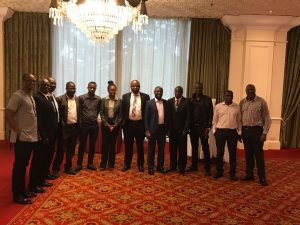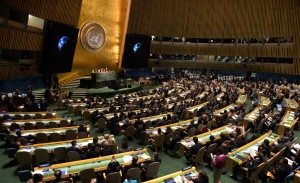 Nigeria, like many other African countries, is fast recognizing the advantages of a green economy that generates growth and improvements in people’s lives while reducing environmental risks and ecological scarcities. There are several policy documents, and initiatives indicate a willingness to pursue their development goals in ways that leverage the opportunities for green economy transition.
Nigeria, like many other African countries, is fast recognizing the advantages of a green economy that generates growth and improvements in people’s lives while reducing environmental risks and ecological scarcities. There are several policy documents, and initiatives indicate a willingness to pursue their development goals in ways that leverage the opportunities for green economy transition.
Nigeria’s long-term development blueprint, Vision 2020, intends that by 2020, the country will have a strong, diversified, sustainable and competitive economy that effectively harnesses the talents and energies of its people and responsibly exploits its natural endowments to guarantee a high standard of living and quality of life to its citizens. Following the Paris Agreement on Climate Change, Nigeria has submitted a Nationally Determined Contribution (NDC) which commits the country to 45% reduction of greenhouse gas emissions by 2030. The policies and measures aimed at delivering this reduction include improving energy efficiency, forest conservation, rural electrification, and putting an end to gas flaring. There is also an ambitious commitment to achieve 35,500 MW of energy by 2030 from renewable energy sources.
However, despite all these laudable goals, huge gaps exist in the form of the capacity and skills needed to realise these stated ambitions and commitments. Indeed many scholars and practitioners have identified lack of or limited capacity as one of the critical barriers hindering the transition to green growth in Africa.
As a measure to kick-start a more systematic identification of existing and additional capacities to achieve Nigeria’s green growth aspirations, the University of Reading, UK under the Global Challenges Research Fund, sponsored a highly interactive consultative workshop titled “Capacity Gap Assessment for Green Economy Transition in Africa: Case Study of Nigeria.” The project leader was Chukwumerije Okereke, Professor of Environment and Development at the Department of Geography and Environmental Science and Associate Director of Reading University Centre on Climate and Justice. The workshop which held at Federal Capacity Territory in Abuja Sandralia Hotel in Abuja and drew a total of 53 technical officers from public and private sectors, and civil societies. Representatives from the donor community such as the European Union and GIZ were also in attendance. The Nigerian workshop was the second of this kind of workshop, the first having been held in Nairobi Kenya on March 12, 2018.
 The workshop in Nigeria created an avenue for a structured reflection and group discussion over the historical and current green growth policy making and low carbon projects implementation with a focus on human and technical capacity. The focus was on six sectors including Agriculture, Transport, Forestry, Energy, Industry, and Sustainable Cities.
The workshop in Nigeria created an avenue for a structured reflection and group discussion over the historical and current green growth policy making and low carbon projects implementation with a focus on human and technical capacity. The focus was on six sectors including Agriculture, Transport, Forestry, Energy, Industry, and Sustainable Cities.
At the workshop, participants agreed that Nigeria’s economy development pathways were undergoing rapid modifications in line with the global commitment to low carbon development. It was however also noted that Nigeria’s ability to maximally benefit from the opportunities offered by green growth is being constrained by limited by capacity gaps at institutional, organisational and individual levels. Some of the critical gaps identified during the workshop relate to policy formulation, stakeholder engagement, emission accounting, financial management, mainstreaming, mini-grid design, energy auditing, impact assessment, solar PVC installation, and monitoring and evaluation.
Some of the key barriers identified include weak legal and policy frameworks, institutional fragmentation, lack of policy continuity, and low private sector participation.
Participants stressed the need for a much more comprehensive green capacity auditing followed with clear targets, an ambitious programme with adequate incentives to close the gaps. The need for stronger partnership between academia, the government and private sectors in the pursuit of green innovation was also stressed. As green skills deployed to undertake green jobs is a critical plank in the green growth transition, it was emphasised that Nigeria should aim to create “an army” of green workers proficient in the wide-ranging set of skills needed to enable the country meet its target of attaining a sustainable economic vision.
 Professor Chuks Okereke, the leader of the project, says:
Professor Chuks Okereke, the leader of the project, says:
“I am delighted that my project has contributed to exposing the need for capacity building for green growth transition in Nigeria and Africa more broadly. It is clear that a lot more work is needed to undertake a more dedicated and comprehensive capacity gap assessment. My team is developing a template which we hope will help Nigeria and other African governments to understand a systematic capacity assessment for green growth transition. We are working towards making the template available in the next three months.”
The Director of Climate Change Federal Ministry of Environment, Dr Peter Tarfa says:
“I thank Professor Chuks Okereke and the University of Reading for funding this very timely workshop on capacity gap assessment for green growth in Nigeria. The Federal government has demonstrated a very strong commitment to tacking climate change and pursing the green economy. The government submitted an ambitious NDC and has also embarked on a very successful green bond initiative to raise money for green projects in Nigeria. Government is keen to work with the academia and private sector to make the green economy a success in Nigeria. I very much look forward to receiving and working with the capacity gap analysis template that is being produced by Professor Okereke and his team.”




